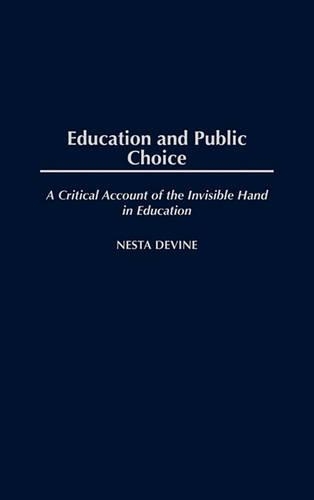
Education and Public Choice: A Critical Account of the Invisible Hand in Education
(Hardback)
Publishing Details
Education and Public Choice: A Critical Account of the Invisible Hand in Education
By (Author) Nesta Devine
Bloomsbury Publishing PLC
Praeger Publishers Inc
30th December 2004
United States
Classifications
Tertiary Education
Non Fiction
379.111
Physical Properties
Hardback
218
Width 156mm, Height 235mm
539g
Description
The single most important educational theory in schools and universities today is not derived from Dewey, Piaget, R. S. Peters, or an other significant researcher or theorist in education. It is public choice theory, which is derived from neo-classical economics. This work describes public choice theory in its component parts and as a coherent and potent contemporary factor influencing education today. It is this theory that licenses talk of accountability; provider capture; outcomes; and delivery as the most significant aspects of education, and thereby sets aside the discourses of responsibility; professionalism; social justice; and learning. Public choice theory is defined by its proponents as the application of economics to politics. It is based on the assumption that economics is the paradigmatic social science that can provide answers to all social questions. By reducing all political and social questions of a particular form of economics it reduces society to a market that is subject to the forces of supply and demand. Citizens become consumers rather than members of a civil society entitled to certain rights. This work describes public choice theory in its component parts and as a coherent and potent contemporary factor influencing education today.
Reviews
[E]ducationists, especially teachers, need to examine the language of economics as applied to education with a suspicious and analytic care. Only then, Devine suggests, will we retrieve the sort of education that has room for altruism, kindness, differences and debate from the policy dustbin into which it has been thrown.-The Times Educational Supplement
"Educationists, especially teachers, need to examine the language of economics as applied to education with a suspicious and analytic care. Only then, Devine suggests, will we retrieve the sort of education that has room for altruism, kindness, differences and debate from the policy dustbin into which it has been thrown."-The Times Educational Supplement
"[E]ducationists, especially teachers, need to examine the language of economics as applied to education with a suspicious and analytic care. Only then, Devine suggests, will we retrieve the sort of education that has room for altruism, kindness, differences and debate from the policy dustbin into which it has been thrown."-The Times Educational Supplement
Author Bio
NESTA DEVINE lectures in the School of Education of the University of Waikato in New Zealand. She specializes in secondary education educational policy and educational theory.
